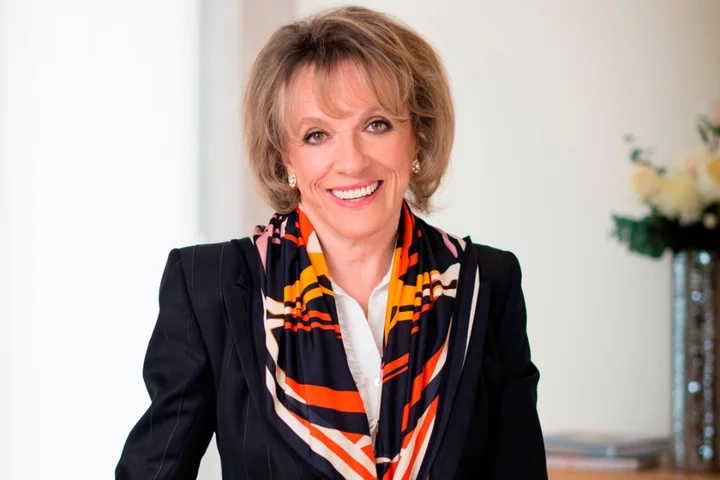
Are ‘The Little Mermaid’ stars Halle Bailey and Jonah Hauer-King dating? Here's the truth behind the rumors
Halle Bailey and Jonah Hauer-King became 'very, very close friends' while working together in 'The Little Mermaid'
2023-05-26 19:57

'The Little Mermaid': Why Jonah Hauer-King owes Prince Eric's role to Harry Styles
Reflecting on his role, Jonah Hauer-King revealed he has 'never done so much training' in his life
2023-05-26 19:52

30 years of 'The Little Mermaid': How the original animated movie changed things for Disney
Disney's 1989 'The Little Mermaid' was a major risk but the costliest animated film ever produced at the time
2023-05-26 19:49

This year's Eurovision reached 162 million viewers
Some 162 million viewers watched this year's Eurovision song competition held in Liverpool, the BBC said Friday also...
2023-05-26 19:49

French Drugmaker Weighs Bids For Scottish Site Behind Covid Debacle
Valneva SE has been approached by about a dozen potential buyers for its Scottish manufacturing site, according to
2023-05-26 19:48

Rose Byrne is up for making a Bridesmaids sequel
Rose Byrne would not hesitate to star in a 'Bridesmaids' sequel if those involved in the original film agreed to return.
2023-05-26 19:29

Daveed Diggs had to overcome vocal hurdles in The Little Mermaid
Daveed Diggs gave his all as Sebastian in the live-action version of 'The Little Mermaid' despite a lack of traditional vocal training.
2023-05-26 19:25

Australian man’s DNA test reveals he’s related to Kate Middleton: ‘We both have smashing smiles!’
An Australian man, who discovered he is a distant relative of the Princess of Wales through an AncestryDNA test, has said they both have the same “smashing smiles” and “great dress sense”. David Willis, 54, a union organiser, who lives in Avenel in Victoria, Australia, with his partner of 18 years, Rodney Kendall, 52, found out, in 2017 after doing the DNA test, that he is Kate’s fourth cousin once removed through his mother’s working class family from Durham in the UK. David, whose friends now call him a “queen”, has also tracked down a fourth cousin in Durham who he speaks to regularly via email – he hopes to one day meet her in person, and joked he might “extend (his) invitation to Kate”. But, despite the genetic evidence, David’s mum “still won’t believe him”, as she “always understood (their) roots to be working class”, but his cousins “are loving” the royal connection. On David’s father’s side, he has discovered that “they were a boat full of convicts”, so he now likes to jokingly refer to himself as “Kate’s convict cousin”. “I thought, what do Kate Middleton and I have in common? We both have smashing smiles, great dress sense and we’re distant cousins,” David said. “I have blue blood – my friends call me a queen – I truly am!” David began researching his family history more than 20 years ago, he explained: “I’m a bit of an amateur historian. “When Ancestry started – I’ve been involved for probably 18 to 19 years – I was able to access materials, resources and documents that in the past I would have had to have travelled to England to gain access to, so I was able to do that all online. “I researched my family on both sides, and that’s when it came up with an interesting connection.” In 2017, it appeared as if Kate was on David’s family tree, he said: “No one believed me – I had to double check the paperwork, and I thought what better way of doing it than testing my DNA through Ancestry. “I was able to just submit my DNA to finally prove and say to everybody that I got my research right.” It was confirmed that David’s mother’s working class family, from Durham in the UK, had links to Kate – they are fourth cousins once removed. David explained their connection: “We share a common ancestor, and we’re fourth cousins once removed. “We go back six generations and Kate goes back seven to our common ancestor, Jane Conyers, who was the daughter of a fellow called Sir Thomas Conyers, the ninth Baronet of Horden. “But, because he had three girls, the title died off with him and they married the local folk in the town. “So one of those girls was called Isabella, and her sister was called Jane. “About six generations ago, when my family sort of fell out of royalty with Sir Thomas, the rest of them were working in the coal mines – I find that fascinating stuff.” David has also discovered a third cousin, the daughter of his great-grandfather, who lives in Durham. He said: “We’ve actually been talking by email for probably one and a half years now, every couple of weeks. “She’s all excited about our family’s story. “And she did her DNA test too, and she’s definitely also related to Kate.” David explained how his family in Australia feel about being related to Kate: “My mother just doesn’t want to know – she doesn’t believe it because our family were always understood to be very working class. “Our family comes from Durham in the north, and my grandfather and his mother emigrated to Australia, after World War One, when my great-grandfather was killed. “He was a coal miner from Newcastle upon Tyne, so my family escaped poverty by moving to Australia, and we just always understood our roots to be working class. “So when there was a bit of a royal connection I don’t think we quite knew how to feel. “Mum still won’t believe me, but my cousins are loving it.” David explained how it feels to have a link to the current royal family: “I’m not a massive royalist by any means, because, in Australia, we’re a few steps removed. “But having said that, I still have a fascination with UK culture – I watched every bit of the coronation for example.” David explained the stark contrast between his mother’s and his father’s side of the family: “On my mum’s side we have sirs and Kate Middleton, but on my dad’s side, on the other side of the world, they were a boat full of convicts, so I joke that I’m Kate’s convict cousin!” Looking to the future, David hopes to meet some of his closer relatives in the UK, he explained: “I’d love to meet the cousin I’ve been emailing and have a trip to Durham. “Maybe I’ll also extend my invitation to Kate and see if she fancies joining!” Read More Kate Middleton sticks to royal protocol after fan asks for an autograph: ‘I can’t write my name’ ‘I did a DNA test and found out I had 7 siblings I didn’t know about’ Kate Middleton has touching response after child asks what it’s like to be a princess Charity boss speaks out over ‘traumatic’ encounter with royal aide Ukraine war’s heaviest fight rages in east - follow live
2023-05-26 18:57

Ramaphosa Sets Powers for Minister to Address Energy Crisis
South African President Cyril Ramaphosa allocated a range of powers to his electricity minister to help address the
2023-05-26 18:50

Dame Esther Rantzen faces stage four lung cancer: key facts about the disease
Dame Esther Rantzen has revealed that her lung cancer has progressed to stage four, after previously announcing in January that she had been diagnosed with the disease. The Childline founder and broadcaster told The Mirror that “nobody knows” if the new medication she is trying is working and a scan “will reveal one way or another”. Earlier in the year, Rantzen, 82, said she had “decided not to keep this secret any more because I find it difficult to skulk around various hospitals wearing an unconvincing disguise” and was “remaining optimistic”. Stage four is when cancer has spread from where it started to another body organ, according to Cancer Research UK, and is also called secondary or metastatic cancer. More than 43,000 people are diagnosed with lung cancer every year in the UK, according to the NHS, making it one of the most common forms of cancer – yet the disease is often shrouded in myths and misconceptions. So, what do you need to know? Here are some important facts about lung cancer… 1. Lung cancer can affect people of any age According to John Costello, a pulmonologist at the Mayo Clinic: “Lung cancer is certainly more common in older people – the average age of diagnosis is 70 years.” This does not mean it only ever affects older age groups, however. Lisa Jacques, lead specialist cancer nurse at Perci Health, says: “Most people develop lung cancer in their 60s and 70s, after many years of smoking, but occasionally people get lung cancer at a much younger age, even in their 20s and 30s.” 2. Lung cancer is not always caused by smoking Although smoking can certainly increase your chances of developing lung cancer, it is not the only cause. “Smoking is the cause of most lung cancers and the biggest risk factor, but about 10% of people who get lung cancer have never smoked,” explains Jacques. Costello adds: “There are some lung cancers which are genetic and may not be smoking-related, and some others are caused by exposures to substances like asbestos, radon gas and passive smoking” – although he says these are “relatively uncommon”. 3. Stopping smoking can help protect you Costello says: “Some of the damage and inflammation caused by smoking can be reversible, but in particular, emphysema is architectural destruction of the lung which causes extreme breathlessness and cannot be reversed.” So quitting smoking might reduce your risk and is always worthwhile for your health – but not starting the habit at all is much better. Speak to your GP if you would like support with quitting. 4. Lung cancer is not always deadly A diagnosis of lung cancer does not always mean certain death, but it is still serious. “Lung cancer has a 65% survival rate for five years in people with localised disease,” says Costello. “If it has spread around the body at the time of diagnosis, the survival rate is only 8%.” However, he says there are “new techniques in screening for lung cancer, such as CT scans in smokers over 50 years with a serious tobacco background”. These “may pick up very small early tumours, which can be removed with up to an 80-90% five-year survival rate”. So if you have concerns about a persistent cough, which is one of the key warning signs, see your GP and get it checked out as soon as possible. 5. Men are more likely to get it but women still need to be aware According to Cancer Research UK, men are more likely to get the disease than women (52% of lung cancer cases are men, compared to 48% of women). However, these margins are small, and women absolutely do need to be aware of lung cancer as well. “Lung cancer has been an increasing problem in women since they caught up with men in terms of smoking habit, and they are therefore at risk if they smoke, and some of the non-smoking related lung cancers are more common in women,” says Costello. Jacques adds: “It is the third most common cancer in the UK, and in women it is the second most common cancer type.” So, whether you smoke or not, look out for the symptoms of lung cancer – like a cough lasting longer than two or three weeks, recurring chest infections, breathlessness or aches and pains when breathing – and see your GP if you have any concerns. Read More Charity boss speaks out over ‘traumatic’ encounter with royal aide Ukraine war’s heaviest fight rages in east - follow live Camilla receives ‘beautiful’ compliment after meeting children at historic library 7 foods that could help you get better sleep Household energy bills set to fall from July: 7 ways to help keep bills as low as possible
2023-05-26 18:45

Damar Hamlin's Buffalo Bills teammates take CPR training as safety returns to practice
Buffalo Bills players took CPR training at the team facility this week as safety Damar Hamlin continues to his recovery from a cardiac arrest.
2023-05-26 18:29

Addison Rae steps out in chic denim mini dress for casual stroll in NYC
TikTok influencer was spotted wearing a casual mini dress in New York City
2023-05-26 18:20
